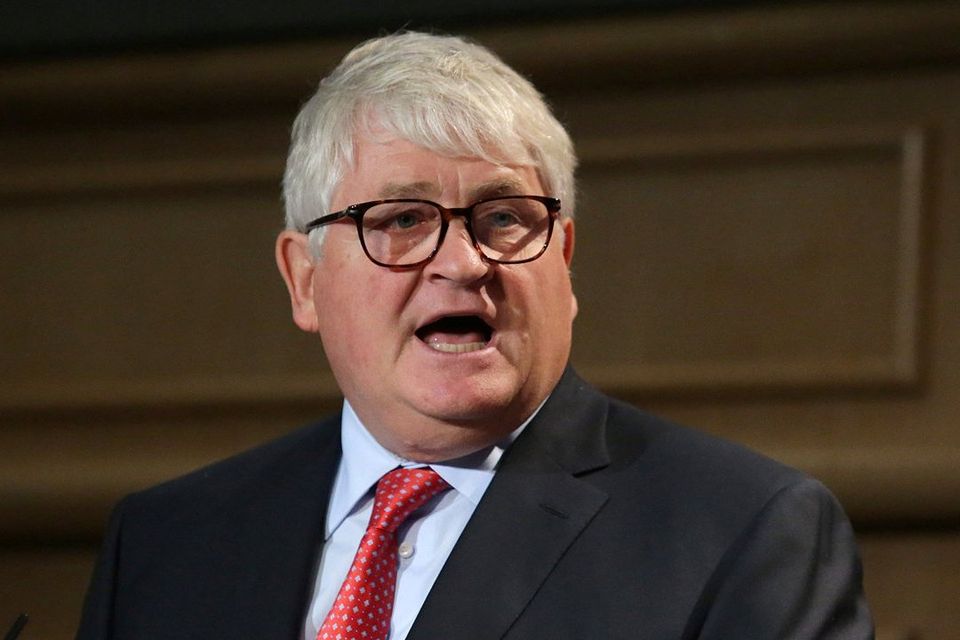The clock is ticking on Digicel's $7bn debt pile
Latest results give some hope but analysts say debt is too large, writes Sean Pollock
Denis O'Brien. Photo: Damien Eagers / INM
When Denis O'Brien woke up the day after he decided to pull a proposed $2bn (€1.81bn) IPO of Digicel, his telecommunications company focused on the Caribbean and South Pacific, he told a reporter from CNBC he was feeling "very happy" with his decision.
"Why would you sell your front garden when you know it's worth a lot of money and why would you sell at a discount?" he said, after choosing not to sell 40pc of his stake in Digicel at the last minute.
It would be hard for anyone looking at how Digicel has fared since the aborted New York Stock Exchange IPO to agree with his analysis, particularly its bondholders.
Digicel has lurched from one turbulent business event to the other, including debt restructures and a 2017 cost-cutting plan - which reduced global head-count by a quarter - and several credit downgrades from rating analysts.
The company, which operates across 31 countries and has around 14 million subscribers, has accumulated a debt pile totalling nearly $7bn. Since starting up in Jamaica in 2001, shortly after O'Brien sold Esat to BT for €200m, Digicel has invested more than $5bn in developing its networks, helped by the bonds which are now maturing.
Recent operating results suggest it will be hard-pressed to cover the accrued debts unless it finds a way to restructure them once again. With bonds worth €1.3bn due to mature in April 2021, Digicel will need to make its move soon. These bonds are trading at 72.8c to the dollar.
Rating agency Fitch has been the latest to signal its concern, downgrading Digicel's credit rating to CC. The move sinks its creditworthiness deeper into 'junk' status.
According to Sul Ahmad, a primary analyst at Fitch, the downgrade was driven by the company's unsustainable capital structure and a slowly stabilising operating performance, meaning it was likely Digicel would be forced into a debt restructuring within the next 12 to 18 months. The move could also trigger a restructuring of bonds due in 2022 and 2024.
"What drove the downgrade is the operational performance is still pretty weak and the yields on bonds, given where they are trading at, are going to make it pretty hard to refinance at that level which could trigger default or insolvency proceedings at some of the other levels, including DGL1 and DGL2 (two Digicel entities)."
Digicel has been particularly kind to O'Brien in the past, having taken $1.1bn in dividends out of the group between 2013 and 2015.
Meanwhile, it is the bondholders who are feeling the heat. Earlier this year, Digicel succeeded in restructuring $3bn worth of debt due in 2020 and 2022, which saw investors agree to swap their bonds and delay getting their money back. Some $1.9bn of the new bonds, due in 2022 and 2024, were recently trading between 16 and 25c to the dollar, highlighting the concerns of the market that the debt problem may not be resolved favourably.
But, despite the downgrade on the bonds and the lower pricing, are there any rays of sunshine poking through the debt-laden storm clouds hovering menacingly above the Jamaican-based business?
One informed source said the decision by the rating agency to downgrade the credit took the company by surprise, given that it occurred days before it released its latest quarterly results.
The latest results were described by the source as positive, despite reported revenue coming in 1pc lower at $554m for the six months to September 2019. The source said the reported income doesn't tell the full story. If the adverse effect of foreign exchange is stripped out, which has been the company's Achilles heel in recent times, revenue is actually up 4pc, to $580m.
Digicel also reported underlying growth across the main parts of its business. Mobile revenue grew to $430m, with the company particularly pleased that data revenues in this segment had grown 15pc to $233m, accounting for more than half of this income stream. Its business solutions segment also rose to $65m, up 14pc in recurring revenue, while home and entertainment revenues were up 7pc to $51m. Additionally, the company managed to cut its net debt from 7.3 times ebitda to 6.9 times.
Ahmad agreed there were some positives from the quarterly performance, but said the results were in line with his expectations from earlier in the year. "There were no major surprises," he said, "for better or for worse."
Digicel has traditionally relied on income from mobile voice, which has since collapsed with the rise of WhatsApp. For Ahmad, the other segments of revenue, such as data and home entertainment, have not grown at the pace required to offset it.
The improving underlying income also counts for less when the near $7bn debt pile is taken into account. "Our primary concern is not where the company could be in 2023 or 2024, it's where the company is going to be by the spring of 2021," Ahmad said. "There isn't really a silver bullet because the company's problems are financial, not business profile, per se."
The political, economic and social crises in some countries served by Digicel also affect its performance. Haiti, one of Digicel's most important markets, is currently experiencing social unrest over food and fuel shortages and widespread economic malaise. Over the past 12 months, the Haitian gourde, the country's currency, has slumped 30pc against the US dollar, in which Digicel's debt is owed.
The strength of the US dollar has made it difficult for the company to monetise its investments across its markets as the local currencies Digicel is paid in continue to plummet in value.
Ahmad added that the Caribbean and South Pacific regions' telecommunication markets are currently a few years behind markets such as the US and Europe, with demand for data starting to accelerate. He said Digicel was being forced to fight for customers with its competitors on price, meaning average revenue per user was being pushed down.
Looking forward, it would appear likely Digicel could undergo some form of debt restructuring. The company told the Sunday Independent that it confirmed with investors during an analyst call that it was currently "evaluating its refinancing options", but that it would not be commenting further until the evaluation had concluded.
Other means of resolving the debt could be explored. In 2015, the company sold mobile towers across Burma for $115m. It has previously hinted at withdrawing from markets where there is "no long-term benefit".
O'Brien could also be tempted to buy back some of the pending $1.9bn restructured debt due in 2022 and 2024, particularly given that the bonds are trading at between 16c and 25c.
For Ahmad, it is difficult to tell what options the company has at its disposal. The lack of action taken by the company on the debt so far has given him cause for concern. He believes the company is still not sending out enough signals to its bondholders that a favourable solution is forthcoming.
"They've already restructured once on the creditors," he said. "Combined with the lack of acceleration of asset sales or bringing in additional equity, and complicated corporate structure, the company is not run in a way that is friendly to the unsecured creditors. I don't know what the company plans to do, what they are able to do legally, or what creditors are willing to accept.
"All of this uncertainty is very concerning for us, given the size of the upcoming debt maturities."
Join the Irish Independent WhatsApp channel
Stay up to date with all the latest news















